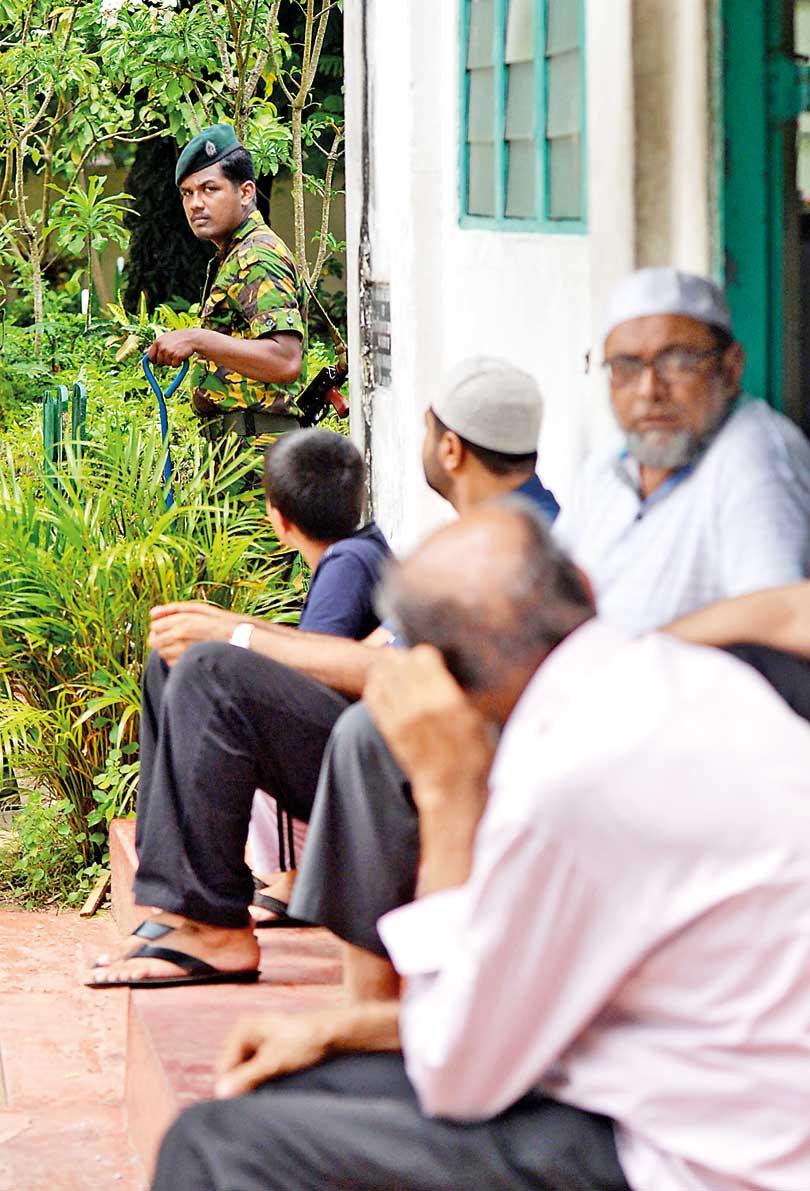01 May 2019 - {{hitsCtrl.values.hits}}

The current crisis poses a dangers of isolating the Muslim community. Here a Sri Lankan Special Task Force (STF) soldier checks a Muslim burial ground in Colombo on April 29, while some Muslims look on. (AFP)
 This May Day coming within ten days of the horrendous Easter attacks is bound to be muted as Sri Lanka recovers from the shock. These heinous crimes that have killed and maimed many hundreds go beyond the concerns of working people, and should be condemned as an attack on humanity. The victims and their families, whether it was working people at prayer or the hotel workers in the line of duty, will into the next generation be fraught with challenges of trauma as much as meeting their day to day economic needs and livelihoods.
This May Day coming within ten days of the horrendous Easter attacks is bound to be muted as Sri Lanka recovers from the shock. These heinous crimes that have killed and maimed many hundreds go beyond the concerns of working people, and should be condemned as an attack on humanity. The victims and their families, whether it was working people at prayer or the hotel workers in the line of duty, will into the next generation be fraught with challenges of trauma as much as meeting their day to day economic needs and livelihoods.
In this context, how can we think of May Day as a day of solidarity for working people? What should we be considering in our thinking and in our practice as we pass a May Day filled with such great sorrow amidst a climate of fear?
The Easter attacks have overnight changed the political environment in the country as if a devastating tsunami has hit us. Tremendous fear, clearly the intention of perpetrators, consumes the country, which is now in danger of religious polarisation.
Newton Gunasinghe in his article titled, ‘May Day after the July Holocaust’, in 1984 correctly warned against the fallout of the July 1983 violence against the Tamil community as having over-determined the class contradictions in the country with an ethnic conflict. Indeed the next two and a half decades led to the tragedy of a protracted civil war.
Echoing the recent analysis of Tisaranee Gunasekara in the Himal Southasian magazine, I also fear that we are now in similar danger of allowing religious contradictions to over-determine our future. Certainly, having been ravaged by ethno-nationalist polarisation, we do not want the explosive mix of religious polarisation into our body politic.
In this context, how can we think of May Day as a day of solidarity for working people? What should we be considering in our thinking and in our practice as we pass a May Day filled with such great sorrow amidst a climate of fear
In this context, confronting ethnic and religious polarisation is a paramount challenge when struggling for solidarity among working people. Indeed, historically during the early decades after Independence it was the left and labour movements that played a bridge-building role even as nationalist mobilisations sought to divide communities.
 The Christian Church – with constituents among Sinhala and Tamil communities – was a channel for communication both before and during the war. Furthermore, its progressive role with respect to working peoples’ concerns was reflected by the work of Christian institutions such as the Christian Workers Fellowship. In this time of crisis, when the Christian Churches have come under attack, they have the major challenges before them of caring for the victims and containing the threat of a backlash.
The Christian Church – with constituents among Sinhala and Tamil communities – was a channel for communication both before and during the war. Furthermore, its progressive role with respect to working peoples’ concerns was reflected by the work of Christian institutions such as the Christian Workers Fellowship. In this time of crisis, when the Christian Churches have come under attack, they have the major challenges before them of caring for the victims and containing the threat of a backlash.
The political tsunami that has hit us with tremendous fear among the people absorbed by so many horrible images of violence requires the working people as well as the people of all faiths and progressive ideologies to come together, and form barriers against polarisation by building inter-ethnic and inter-religious relations.
The Muslim community, in rejecting the extremists, has been in the forefront of identifying the perpetrators of the horrible Easter attacks. However, these attacks by a few mad men and women have made the broader Sri Lankan population suspicious of the Muslim community as a whole. Muslim friends tell us of the gaze, the suspicious look on the faces, the checking and the round ups, which they don’t know how to respond. Given their daily humiliation, broader social efforts to safeguard their dignity is a priority.
The isolation of the Muslim community well predates these attacks. In the East and North, Muslims faced the wrath of the LTTE in the horrible Kathankudy and Eravur mosque massacres in the East with close to one hundred and fifty dead, and the ethnic cleansing of the Muslim community from the North.
The eclipse of Islamophobia with the US led “war on terror” after 2001 globally isolated the Muslim communities internationally as the “other”. And again in Sri Lanka, the attacks by the Sinhala Buddhist chauvinists including the many riots pushed them into a corner. The current crisis poses a dangers of isolating the Muslim community from the Christian communities, and a backlash by all the other communities in Sri Lanka.
These attacks by a few mad men and women have made the broader Sri Lankan population suspicious of the Muslim community as a whole. Muslim friends tell us of the gaze, the suspicious look on the faces, the checking and the round ups, which they don’t know how to respond
Historically, the left both internationally and in Sri Lanka have often failed to understand and sympathise with Muslim social life and aspirations. The priority of the working class movement in Sri Lanka today – though it has suffered major setbacks with many from the Old Left aligning with the Sinhala Buddhist nationalists – should be to reach out and defend the broader Muslim community.
A reality that is facing Muslim workers, including the many informal workers involved in trades from collecting scrap iron to tailoring, is isolation and the danger of direct attacks on their livelihoods. Indeed, ethno-religious violence often targets people’s working lives and seeks to destroy their capacity to reproduce their day to day economic lives.
If May Day historically remembered the exploitation of working people, this May Day in Sri Lanka amidst the dangers of polarisation should focus on the exclusion of working people, particularly the Muslims. Solidarity with the excluded working people from the Muslim community should begin with engagement that is based on principles of equality and dignity.
26 Oct 2024 1 hours ago
26 Oct 2024 2 hours ago
26 Oct 2024 3 hours ago
26 Oct 2024 8 hours ago
26 Oct 2024 8 hours ago